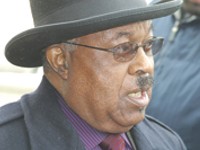Meto ink - 7.19.06
[
{
"name": "500x250 Ad",
"insertPoint": "5",
"component": "15667920",
"parentWrapperClass": "",
"requiredCountToDisplay": "1"
}
]
RHINOS REPEAT?
In 1999, the Rochester Rhinos did the unthinkable: they beat four straight Major League Soccer teams en route to claiming the US Open Cup title. In doing so, they became the first lower-level team to claim the Cup in the MLS era. That put Rochester on the national soccer map, but did it also set the bar unreasonably high for future Rhinos squads?
Last Wednesday, Rochester played its opening match in the 2006 Open Cup tourney, thumping the lower-tier New Hampshire Phantoms, 5-1. That victory was expected, but now the Rhinos have to play MLS's New England Revolution, on August 2. From here on out it'll be all MLS foes, which raises the question: can the 2006 Rhinos replicate the 1999 run?
Current Rhinos assistant coach Bill Andracki, a goalkeeper on that 1999 team, says it's possible, but he also says it's almost unfair to compare this year's edition to the Cup-winning squad, which featured Rhinos legends like goalie Pat Onstad, defender Scott Schweitzer, midfielder Yari Allnutt, and forward Doug Miller.
"That was a great team," he said after the win over New Hampshire. "On paper, I would have put that team up against anyone."
The level of play in MLS has improved over the last seven years, Andracki said, which will make it tough for the Rhinos to beat four straight top-level teams this year. But, he added, the teams in the United Soccer Leagues First Division, which includes Rochester, have also gotten better.
Andracki also believes the 2006 Rhinos have the potential to beat any team in the country, including those in MLS. However, he said, the fates need to be aligned just right. "If we can put away our [offensive] chances and come together for a common goal, this team certainly has the potential to make a good run at it," he said.
--- Ryan Whirty
DATE OF RECKONING
If at first you don't succeed... wait a few years and try again.
That's the strategy County Legislature Republicans appear to be following. Two years ago, County Executive Maggie Brooks' Budget Advisory Team handed her a stack of recommendations to help get the county out of financial trouble. Some of those she followed; others were consigned to the dustbin. And a few lay in limbo.
Prominent among these was a proposal to shift the county executive's deadline for presenting the next year's budget. Currently, the deadline is in mid-October --- a few weeks before the election. The advisory group recommended moving it to mid-November. Their reasoning: that would prevent partisan politics from influencing budget decisions.
The Republican majority in the CountyLegislature tried to get just such a proposal passed, but the Democratic minority objected --- as did the overwhelming majority of speakers at a public hearing. Their concern was that the proposal was really designed to protect legislators and the county executive from a bad-news budget before the election.
Last week, Legislature President Wayne Zyra and Majority Leader Bill Smith resurrected the proposal, urging the legislature to "take decisive action now."
A cynic could be forgiven for noticing two things. First: next year, by the county's own estimates, the budget deficit will be well over $50 million. By that time, Brooks may have run out of all but the most difficult options for balancing the budget --- draconian cuts or a property-tax increase, both of which she has consistently ruled out.
Second: next year Brooks will be up for reelection.
The Zyra-Smith proposal will be discussed in the Legislature's Agenda-Charter Committee and Ways and Means Committee on August 2, at 5 and 6 p.m. respectively, in the legislative chambers of the CountyOfficeBuilding.
--- Krestia DeGeorge
BOARD RACE TIGHTENS
Jeff Henley's withdrawal from the Rochester School Board race leaves the seat without an incumbent, and that could make this fall's election more competitive.
Henley, who was appointed to the board early this year to fill a vacancy, had served for only six months. The Monroe County Democratic Committee had endorsed him as its candidate for a full term, but he faced a primary in September, challenged by financial advisor Allen Williams and attorney Van Henri White.
Despite his short service, Henley had the advantage of incumbency and name recognition. But he pulled out of the race July 10 after police accused him of driving while intoxicated, a charge he is fighting. A few days later, the Democratic Committee designated Williams as Henley's replacement.
"I think it will make for a very interesting and competitive race," says former board member James Bowers. "They are both highly qualified candidates, both African-American men, both very successful in their fields."
While Williams is known among political insiders, he lacks White's name recognition. White hosts a talk-radio show on WDKX, is a former assistant district attorney, and for four years of the Johnson administration was a special assistant to the mayor for crime and violence. In addition, he has represented clients in several high-profile cases, including some against the CitySchool District.
Henley will serve on the board through the end of the year, the remainder of his appointed term. And last week other board members were expressing regret that he won't be continuing. "He has made a solid contribution in a short time," said Board President Domingo Garcia.
"It's unfortunate," said board member Tom Brennan, "because I think those of us who know him can say he's not a reckless person. He is never polarizing. He's been an attentive listener, and he wants all voices to be heard."
--- Tim Louis Macaluso
ON-THE-JOB REVIEW
It's been a tough three months for Rochester's new police chief, David Moore. Violent crime is keeping pace with last year's high rate, and on the day of a City Newspaper interview, an attempted robbery resulted in yet another death. In a half-hour discussion, Moore talked about his initiatives to deal with the city's violence.
"Nothing is new under the sun," said Moore, "particularly in police work." But how an organization allocates its resources, he added, can either propel a unit forward or leave it stagnant. "I think what we need to do is do a better job with our resources," said Moore. "I really do." When he took office, he said, he promised to spend 90 days evaluating his department. Now that those 90 days have passed: "The assessment is that we're doing a good job, but we can do things more efficiently."
An integral component in that efficiency, Moore said, is re-evaluating how officers respond to calls. High-priority calls, he said, are those involving life-threatening situations, calls with information that could lead to a suspect, or responses to an area where shots have been fired. On those calls, he said, "I think we do a very good job as far as our call-response time, between 5, and I think 10, 12 minutes last time I checked."
But crimes such as homicides can quickly deplete the department's manpower. "Initially, it's important to have 20 officers at a shooting," he said, "but once you realize things are sort of neutralized, we need officers to get back in service." Finding ways to return those officers to their beats faster is one way to stretch resources, he said. And, he said, the department must do a better job explaining to city residents the difference between low and high-priority calls --- explaining, for instance, that they can't expect immediate response to a call about a stolen bike.
"We hear about late response time, that they're delayed," he said. "I think maybe it's a question of how we educate."
He doesn't deny that Rochester could use more police officers. "I don't think we need to double our force," he said, "but do we need more officers? The more officers that we have, the more techniques, the more strategies, the more things that we can try."
But the department can begin to address Rochester's violent-crime and drug problems if it gives the impression of being larger than it is, he said. "We want to give the appearance that we're everywhere," said Moore. To accomplish that and to beef up the department's strength in some of the city's more troubled areas, he recently decided to place 38 new police-academy graduates in the department's tactical unit. Officers in that unit deal specifically with street crimes.
--- Sujata Gupta
WE'VE GOT ISSUES
Fed up with politics and politicians?
Think no matter what you do, the situation's not going to change? The Center for Governmental Research wants to change your mind. The Rochester-based think tank is pouring plenty of resources (its own and the Rochester Area Community Foundation's) into fighting voter apathy this election season.
"It's a vicious cycle," says CGR research associate Mike Caputo. When voters get apathetic and check out, politicians have more leeway to abuse the system. That, in turn, increases voters' feeling of helplessness and apathy.
Caputo and his colleagues at CGR hope this is the year to reverse that trend. For the first time in a dozen years, there's no incumbent in the governor's race, and CGR will try to leverage that fact to get more voters interested in issues and out to the polls in November.
The first step: a statewide issues poll. That poll (available on the web at www.newyorkmatters.org) shows which issues the state's voters care most about. Not surprisingly, taxes, education, and jobs top the list. Somewhat more surprising is poll respondents' attitude toward taxes. One-third said the level of taxes was their biggest issue, but two-thirds had a bigger concern: how taxes are spent.
"It's not just 'cut my taxes,'" says Caputo, "it's 'what are you doing with my money?'"
Last week Caputo and fellow CGR research associate Erika Rosenberg held a press conference to release the survey's findings specific to the Rochester-Finger Lakes region (Monroe, Ontario, Orleans, Genesee, Livingston, Allegany, Chemung, Schuyler, Seneca, Steuben, Tompkins, Wayne, Wyoming, and Yates counties). Again, the results were not surprising. Taxes and jobs were bigger issues here than they are statewide. Education ranked somewhat lower than the state average.
"Rochester was more negative than other parts of the state or the state as a whole" when it comes to our outlook on the economy, says Rosenberg.
Both she and Caputo are former political reporters, which may explain their keenness to inject substantive issues into this year's election. They've witnessed the other extreme firsthand.
"You just see a lot of horse-race polls," says Rosenberg. "I definitely think there's kind of overkill. It definitely takes up more of the coverage than people would like to see."
The CGR issues poll represents only the first step in a drive to keep voters interested throughout the election season.
In addition to rolling out similar localized breakdowns of the survey across the state, the group plans to sponsor a series of forums statewide.
--- Krestia DeGeorge
RACE OVER
Last week, the last Democratic primary campaign for a local congressional seat abruptly ended. PalomaCapanna, an attorney from Webster, pulled out of the race for Congress in the 25th district.
The district, which lies mainly in OnondagaCounty, swings westward along LakeOntario to include a few MonroeCounty towns. It's been held by Republican Jim Walsh for nearly two decades, but he's considered vulnerable.
Capanna had picked up a handful of important endorsements in her campaign against OnondagaCounty resident Dan Maffei. But last week, she pulled out and threw her support behind Maffei, citing "the interests of a united Democratic front for the 2006 elections."
Her move frees Maffei to use the considerable amount of money he's raised strictly for his fight against Walsh.
--- Krestia DeGeorge
OPEN FOR BUSINESS
In less than 10 years, the South Wedge area's commercial vacancy rate has dropped from 27 percent to 9 percent. There is, however, a lot more work to be done, says South Wedge Planning Committee Executive Director Dan Buyer.
That's one reason behind a new SWPC contest. It's open to anyone who can come up with a business plan designed specifically for the South Wedge. Among the businesses the area could use, says Buyer, are an ice cream shop, a movie theater, and a formal restaurant. Visit www.swpc.org to view a market study and for a contest application. Submissions are due by November 15, with winners announced December 1. There'll be a $1500 main prize and a $500 prize for a high school or college student.
In conjunction with the contest, the SUNYGeneseoSmallBusinessDevelopmentCenter, which aids many shopkeepers in the South Wedge, will hold a business-planning seminar. It'll be offered on two different dates: 6 to 9 p.m. September 13 and 9 a.m. to noon September 30; admission is $25. Register by visiting the same website.
--- Sujata Gupta










